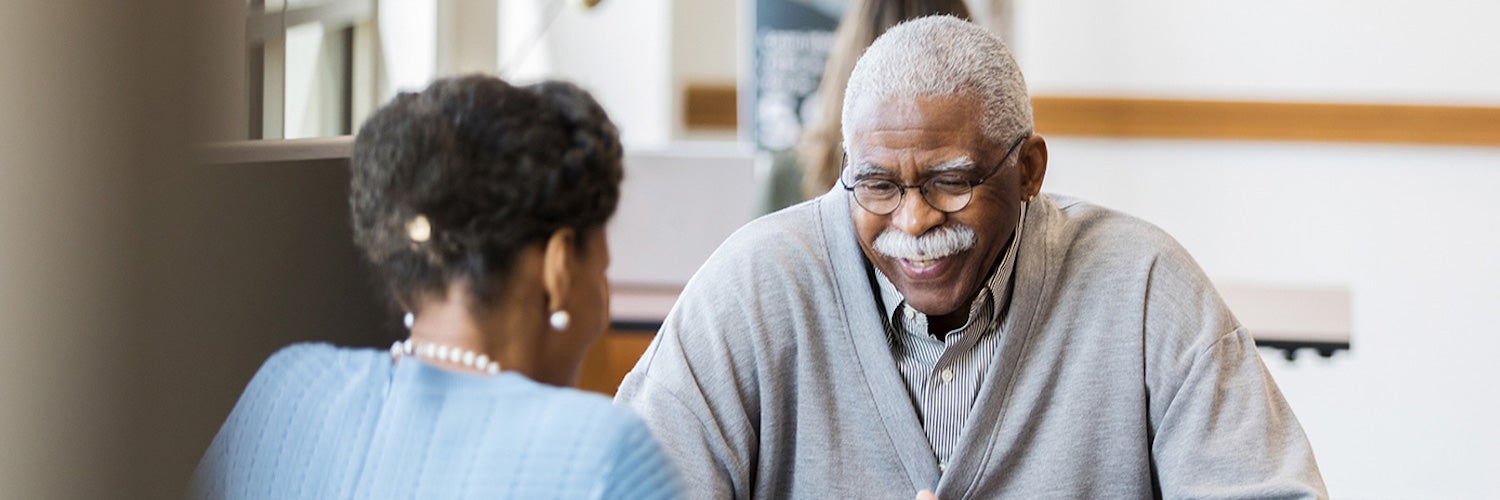
Americans are in the midst of a retirement crisis. According to Northwestern Mutual, one in three Americans has less than $5,000 in retirement savings, while one in five Americans has no retirement savings at all.
It’s no surprise that seniors are outliving their financial resources. The most recent Federal Reserve Survey of Consumer Finances found that the total median debt for households headed by an individual aged 65–74 was $42,000 in 2016.
So, if you’re a senior struggling with debt, it may be comforting to learn that you’re far from alone. Comfort doesn’t pay the bills, so we’ve compiled a list of links to resources that provide financial services for seniors in need.
Table of Contents
- Emergency Financial Assistance & Financial Aid for Seniors
- Food and Nutrition Assistance for Seniors
- Housing & Utility Assistance for Seniors
- Medical Financial Assistance for Seniors
- Education & Counseling for Seniors
Emergency Financial Assistance & Financial Aid for Seniors
There are many programs that help seniors find free or discounted services. In some cases, individuals may need direct financial assistance in the form of a cash grant or low- or no-interest loan. A cash grant for basics can ensure you don’t miss essential payments that will ding your credit report, especially if you’re struggling with debt or credit issues.
The following is a list of organizations and resources that offer direct emergency financial assistance to seniors in need of help paying for things like rent, groceries, hygiene items and other essentials.
Adult Protective Services (APS)
Generally speaking, Adult Protective Services is primarily an investigative resource for those experiencing abuse or neglect. However, APS also helps adults with disabilities find food, clothing, shelter or medical care. The program also offers counseling and financial management.
Learn more about APS offerings on the Department of Justice website.
Catholic Charities USA
Catholic Charities is a national organization dedicated to reducing poverty in America. The organization offers direct funding for food and nutrition needs, disaster relief and affordable housing, among other things.
Use the “Find Help” tool to get in touch with a local CCUSA chapter.
Episcopal Church Relief and Development Service
The global Episcopal Church has a Relief and Development program dedicated to helping communities struggling with hunger, poverty, disaster and disease. The organization specifically prioritizes disaster relief in the United States, offering technical, educational, and financial resources to affected diocese.
Individuals can find out if financial assistance is available locally by contacting a nearby Episcopal Church or by contacting the program directly.
International Association of Jewish Free Loans
“Neither shall ye lay upon him interest” — in accordance with the Biblical rule against usury, there are many Jewish organizations dedicated to providing interest-free loans to individuals and families with urgent financial needs. These loans are available for everything from homeless assistance and Alzheimer’s care to in-vitro fertilization, entrepreneurship, student loans and more.
Jewish Free Loans are available to qualified, low-income individuals regardless of faith tradition. Contact a local office of the IAJFL to find out how to apply.
Jewish Federation of North America
The Jewish Federation of North America includes over 300 non-profits, most of which offer some form of emergency financial assistance to low-income individuals and seniors regardless of religion. Many local JFNA offices also manage a special grant earmarked specifically for one-time cash grants to help with emergencies like eviction, food, utility shut-offs, etc.
Individuals can use the “Fed Finder” tool to contact their local Jewish Federation for more information.
Love, Inc.
Love, In the Name of Christ, or Love, Inc., is a nondenominational Christian network of churches whose mission is to help strengthen local communities through service. This includes direct emergency financial assistance, which is provided through member churches.
Contact a local Love, Inc. chapter to learn how to apply.
Lutheran Services in America
The LSA is an alliance between the Evangelical Lutheran Church in America and 300 health and human service organizations serving people in need in the United States and the Caribbean. Services include senior care, disaster response, employment assistance, affordable housing and more.
The LSA has a database of member organizations that’s searchable by need that individuals can use to locate assistance.
NetWish
Created in 2002, NetWish is a charitable project by an anonymous Philadelphia businessman who makes cash donations of up to $200 directly to Americans in need. Payments are issued in the form of gift certificates and prepaid debit cards.
Individuals can apply via form on the NetWish website.
Second Harvest Food Bank Helpful Resources Tool
The Second Harvest Food Bank is a non-profit that provides food to low-income individuals in Silicon Valley. They also offer a nationwide search tool that will locate not just food assistance but also housing, transit, health and cash or financial aid.
Use Second Harvest’s search tool to browse available services by zip code.
Social Security
Social Security is a tax-funded public assistance program that provides cash benefits to people who are retired, disabled or are the surviving spouse of an individual with benefits.
You can apply for Social Security benefits on the SSA website or by visiting your local Social Security office.
Society of Saint Vincent De Paul
The Society of Saint Vincent de Paul is a Catholic lay organization dedicated to ending poverty through systemic change. The Society offers direct assistance in the form of food, clothing, furniture, appliances, transportation, rental assistance and other financial aid.
Contact your local SVdP to find out more and apply.
Supplemental Security Income
A subsidiary of Social Security, Supplemental Security Income is a government program that provides monthly cash benefits to adults and children with disabilities as well as qualified low-income individuals without disabilities who are 65 or older. Grant amounts vary according to individual needs and are earmarked for basic necessities like food and clothing.
Tax Credit for the Elderly and Disabled
Adults who are 65 or older or are legally disabled are eligible for a tax credit, which will lower the amount of federal income tax you are expected to pay.
For more about the Senior Tax Credit, eFile.com offers a plain-text explanation of the credit, its qualifications and its benefits.
Food & Nutrition Assistance for Seniors
Often when seniors struggle with financial hardship, one of the first things to suffer is their nutritional wellbeing. If mobility is an issue, it can be especially difficult to find affordable groceries that are healthy and nutritious.
Grocery expenses also tend to be something many people pay for using a credit card, so when groceries become unaffordable, it can cause a ripple effect for debt problems.
The following organizations and programs offer free or reduced-cost groceries and meal programs to seniors with qualifying financial needs.
Commodity Supplemental Food Programs
The CSFP is a federal nutrition program that provides food and funds to seniors that demonstrate qualifying financial need. Individuals must be 60 or older and at or below 130 percent of the Federal Poverty Income Guidelines to qualify.
Contact your state CSFP representative to apply.
Feeding America
Individuals can find local soup kitchens and food pantries through Feeding America, the nation’s largest non-profit anti-hunger organization. FA partners with over 200 food banks across the country, feeding over 4 billion people annually.
You can use the Feeding America food bank finder to search for the location nearest you.
Meals on Wheels
More than 5,000 community-based organizations across the country deliver free and reduced-cost groceries and prepared meals to homebound seniors as a part of the Meals on Wheels program. Individuals can apply directly to the member organization nearest them by using MoW’s locator tool.
Senior Farmers’ Market Nutrition Program
With funds from the Senior Farmers’ Market Nutrition Program, states distribute vouchers and coupons to seniors to be used on eligible foods at farmers’ markets, roadside stands and community agriculture programs.
To find out where to obtain SFMNP vouchers, contact your state representative.
Supplemental Nutrition Assistance Program (SNAP)
Formerly called food stamps, the Supplemental Nutrition Assistance Program (SNAP) provides funds to low-income individuals and families for groceries and other essentials.
Individuals can apply via the USDA website or contact their state SNAP representative directly.
Housing & Utility Assistance for Seniors
Falling behind on a mortgage is one of the quickest ways to damage credit and go down a slippery slope of increasing debt. Luckily, seniors can find financial assistance for rent or mortgages as well as home repair expenses, property taxes, weatherization assistance and more.
AARP Foundation Finances 50+
For those who live in Baltimore, Denver, New Orleans, Phoenix, San Francisco, Seattle or Washington, D.C., the Foundation Finances 50+ program is a series of three free, in-person financial education workshops for seniors.
The classes help seniors learn to create budgets and financial goals, take charge of credit and debt, and develop a savings plan. For those who can’t attend in person, AARP also offers PDFs of the participant and volunteer guides that accompany each class.
Department of Housing and Urban Development
The federal government provides housing assistance in a variety of forms, including public housing, housing vouchers, relief for utility bills, weatherization assistance, home repair help, property tax programs and more.
Senior Living offers a plain-text explanation of HUD-sponsored senior housing assistance options, or you can contact the Office of Housing directly.
Free Gas USA, Inc.
If you primarily use your car for work, school or medical appointments, you may be eligible for a gasoline grant from Free Gas USA. Though the organization is a 501(c)(3) non-profit, it does not have a formal website — interested individuals must email info@freegasusa.org to apply.
Low Income Home Energy Assistance Program
The Department of Health and Human Services offers financial assistance to help low-income individuals and families pay for heating and cooling expenses through LIHEAP, or the Low-Income Home Energy Assistance Program. Grants can also be used for insulation, ducts, repairs or to replace inefficient HVAC units. Individuals must demonstrate low-income status in order to qualify.
Read more about the program on the LIHEAP website.
USDA Housing Repair Program
The U.S. Department of Agriculture provides loans and grants to low-income homeowners to remove health and safety hazards from their home. The program is available through the Department of Agriculture’s rural development office, so individuals must live in an eligible area in order to qualify.
Visit the USDA website to learn more and apply.
USDOE Weatherization Program
The Department of Energy provides approximately 35,000 low-income homes annually with weatherization improvements and upgrades that help save an average of $283 or more in utilities each year.
Benefits are distributed via state agencies — you can find yours via the National Association for State Community Services Programs search tool.
Medical Financial Assistance for Seniors
One of the greatest financial burdens seniors face is healthcare. The programs below can help individuals find affordable healthcare, prescription medications, specialized health services, necessary equipment, and more.
AUDIENT Alliance
The Alliance for Accessible Hearing Care, or AUDIENT, helps low-income individuals who are deaf or hard of hearing access quality hearing aids and related healthcare at low costs.
Learn more about hearing aid assistance on AUDIENT’s website.
Donated Dental Services (DDS)
For low-income individuals in need of dental care, DDS is a network of volunteer dentists and dental labs that offer services to those who cannot afford treatment or get public aid.
Find out if you qualify for DDS by contacting your Donated Dental Services State Agency.
EyeCare America
With a pool of over 5,000 volunteer ophthalmologists, EyeCare America offers free medical eye exams to seniors who are 65 or older, have no eye care benefits, and have not seen an ophthalmologist in three or more years.
Learn more and find out if you qualify on the EyeCare America website.
HRSA Health Centers
The Health Resources and Services Administration runs a network of health centers that offer comprehensive medical services in areas where economic, geographic or cultural barriers limit access to affordable health care. Services include general medicine, mental health care, pharmacy services, substance use or abuse rehabilitation and oral health care services.
To find out if you qualify for care or to locate the HRSA health center nearest you, check the HRSA website.
iCanConnect
People with significant vision or hearing loss may be able to access free equipment and training from iCanConnect, a project of the National Deaf-Blind Equipment Distribution Program. To qualify, individuals must meet federal disability and income guideline standards.
Find more information about the program at the iCanConnect website.
Medicare & Medicaid
The government provides health insurance to low-income and elderly individuals via Medicare and Medicaid. Medicaid is designed for seniors with limited income and pays for visits to healthcare providers, hospital services, x-rays, prescription drugs, etc.
Medicare has several parts. Medicare Part A is for hospital insurance and is free if you are 65 years old and you or your spouse have paid Medicare taxes for at least 10 years while working.
Medicare Part B is a reduced-fee insurance plan for seniors that covers doctor visits and outpatient services. Medicare Part D provides partial coverage of prescription drug costs.
To learn more about Medicare and Medicaid, consult the Department of Health and Human Services website.
Financial Education and Counseling for Seniors
Seniors can obtain essential skills for free from a number of organizations both online and in person. Whether it’s basic budgeting and savings strategies or a complicated reverse mortgage decision, seniors shouldn’t have to navigate their finances alone.
The programs below offer education and counseling for seniors on financial strategies, employment, taxes, civil law concerns and more.
Bank of America Better Money Habits Program
The Life Priorities tool by Bank of America offers financial advice to individuals according to their age, work status, financial concerns and more. Seniors approaching or living in retirement can get advice on reducing debt, improving credit, buying or refinancing a home and more.
FDIC Money Smart for Older Adults Program
Seniors and their caregivers can find self-paced financial literacy lessons and resources via the Money Smart for Older Adults Program, created by the FDIC and the Consumer Financial Protection Bureau. Topics include elder abuse, medical identity theft, homeowner scams, planning for unexpected life events and more.
IRS Retirement Tax Advice
Retirement income is taxed differently than traditional income, and filing incorrectly can cost a person money. The IRS has a list of resources and helpful links designed specifically to help seniors navigate their taxes successfully and save money.
Legal Services and Assistance Programs
Often referred to generally as “legal aid,” legal assistance programs offer free legal aid in civil matters like employment concerns, family or domestic disputes, health or disability income maintenance, bankruptcy, debt relief, unfair sales practices, and more. Generally, individuals who are 60 or older do not need to meet low-income qualifications to apply for legal aid.
To find out if you qualify for free legal aid, check out LawHelp.org or the Legal Services Corporation website.
National Association of Senior Legal Hotlines
There are 16 member hotlines that offer free legal information, advice and referrals to Americans aged 60 and older as a part of the National Association of Senior Legal Hotlines. Individuals can get help with credit card debt, home foreclosure, estate planning and more.
Check the NASLH site to find the hotline that addresses your concerns.
National Council on Aging’s Economic Checkup
The NCOA is a charitable advocacy organization based on Washington, D.C. that works to secure jobs and benefits and improve health and living conditions for American seniors. Among their resources is the Economic Checkup tool, which offers individuals confidential advice on topics like money management, credit and debt management, retirement planning, avoiding scams and more.
NCOA Reverse Mortgage Counseling Service
A reverse mortgage is a unique type of home loan available to homeowners who are 62 or older. They can be hugely beneficial, but they come with significant risks, so it’s important for seniors to get the appropriate financial counseling before deciding to take out a reverse mortgage.
The National Council on Aging partners with a nonprofit organization called GreenPath Financial Wellness to offer reverse mortgage counseling, which helps individuals evaluate the pros and cons of a reverse mortgage and decide if it’s right for them.
Low-income individuals or those facing foreclosure, disability or bankruptcy can delay payment of their counseling fee until after their mortgage has closed.
To learn more, check the NCOA website.
PensionHelp America
Seniors with either a pension or 401k plan can consult with PensionHelp America, which helps retirees utilize their retirement benefits wisely. PensionHelp also connects individuals with free assistance from counseling agencies, government programs and legal service providers.
Learn more on the PensionHelp America website.
Program of All-Inclusive Care (PACE)
PACE is a Medicare program that offers full-time care for adults who are 55 or older, certified by the state to need nursing home care and are able to live safely in a community. Services include nursing, physical therapy, meals, nutritional counseling, social work, prescription drugs and hospital care when necessary.
Check the PACE website to learn if you or your loved one qualifies for all-inclusive care.
Senior Community Service Employment Program
Seniors who are unemployed but able to work can consult the SCSEP for help obtaining long-term employment. The program offers employment counseling as well as skills training in areas like computer programming, office administration and more.
Find more information on the SCSEP via the Department of Labor website.
Workforce Investment Act Programs
Thanks to the Workforce Investment Act, there are over 2,500 American Job Centers around the country where seniors can access employment services and counseling for free. American Job Centers offer skills assessments, training services and follow-up services for at least 12 months.
Find your nearest American Job Center on the Department of Labor’s Career Onestop page.
These resources provide a wealth of opportunity for seniors to take charge of their finances and live out their retirement in peace. Regardless, it may be necessary to get a professional involved to successfully correct past financial mistakes that may still haunt your credit and wallet. In these cases, it’s important to ensure you’re choosing a credit repair specialist that’s patient, reliable and trustworthy to help you or your loved one.
With a little bit of cleaning up, you can have your credit back in shape and can spend those sunset years feeling confident that you’re financially secure.






